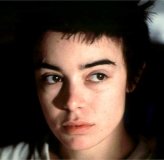 Starring
Élodie Bouchez, Natacha Régnier, Grégorie Colin, Jo Prestia,
Patrick Mercado.
Starring
Élodie Bouchez, Natacha Régnier, Grégorie Colin, Jo Prestia,
Patrick Mercado. Written by Erick Zonca & Roger Bohbot.
Directed by Erick Zonca.
 Starring
Élodie Bouchez, Natacha Régnier, Grégorie Colin, Jo Prestia,
Patrick Mercado.
Starring
Élodie Bouchez, Natacha Régnier, Grégorie Colin, Jo Prestia,
Patrick Mercado.
Written by Erick Zonca & Roger Bohbot.
Directed by Erick Zonca.
Grade: B+
Review by Jeff Vorndam.
I hate movies with acting so natural and uninhibited it seems as if the actors are hyperreal. People you see at a café every day now seem fake, their gestures calculated, and their conversations purposefully shallow in comparison. I would sooner believe Élodie Bouchez' Isa than my grandmother, who is far less convincing in her matriarchal role than Bouchez is in the role of a young drifter on the fringes of French society.
Getting the plot summary out of the way, The Dreamlife of Angels takes place in Lille, France, where Isa is given a job at a sewing factory. The work is tedious, and the conditions are demeaning, but Isa meets a seemingly kindred spirit in the rebellious Marie (Natacha Régnier). They befriend, perhaps too quickly, and Marie invites Isa to stay at her house. Marie's house turns out to be someone else's--she is housesitting for a family that has just been killed in an automobile accident. Only their daughter has survived, but she is in a coma.
Isa, easygoing and cheerful, and Marie, off-putting and saturnine, are a study
in contrasts. The film tracks their differences through their aspirations, their
relationships with men, and their explorations of their inner selves. They meet
a couple of bouncers at a club. Isa develops a platonic friendship with one,
and Marie a loveless sexual relationship with the other, the amiably rotund
Charly (Patrick Mercado).  Marie's
mentality is to use sex to escape her low social status, and she later finds
a more affluent tool to latch onto. However, Grégorie Colin's Chriss
is an arrogant Lothario who only uses Marie for sex out of boredom. Isa, on
the other hand, is quite content where she is. She stumbles across the diary
of the comatose daughter, whose innermost thoughts and emotions strike a chord.
Isa soon finds herself identifying with the girl and visits her in the hospital.
In a poignant scene, Isa picks up where the girl left off in her diary and writes
in her stead.
Marie's
mentality is to use sex to escape her low social status, and she later finds
a more affluent tool to latch onto. However, Grégorie Colin's Chriss
is an arrogant Lothario who only uses Marie for sex out of boredom. Isa, on
the other hand, is quite content where she is. She stumbles across the diary
of the comatose daughter, whose innermost thoughts and emotions strike a chord.
Isa soon finds herself identifying with the girl and visits her in the hospital.
In a poignant scene, Isa picks up where the girl left off in her diary and writes
in her stead.
As the story unfolds, it never seems dull despite its pedestrian pretensions. The characters are so well-developed and acted that I strongly identified with them. As "angels" they lead humdrum lives, but their minds are elsewhere--Isa's upward toward enlightenment and Marie's on a path of destruction. First time feature director Erick Zonca is purposely ambiguous in tying together the coma subplot with Marie's fate. A lesser movie would have made the connection too overt. He instead shows great regard for his characters, keeping his camera at eye-level and capturing their emotions unblinkingly in close-ups. The cinematography is also commendable; Agnès Godard imbues the surroundings with a bluefish tinge to emphasize the squalor of the girl's lives.
I was mightily impressed with the warm and generous Bouchez and the fiery and volatile Régnier, to the point that they overshadowed the vaguely dissatisfying climax. The coda also softens the blow, as if to suggest this is simply one tale of many. The dreamlife goes on, and Isa's optimism and hope is its energy.
Review © May 1999 by AboutFilm.Com and
the author.
Images © 1999 by Sony Pictures Entertainment,
Inc.
Send us a comment on this review. We'll post a link to the best comments!